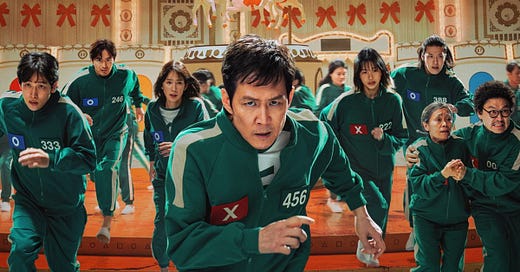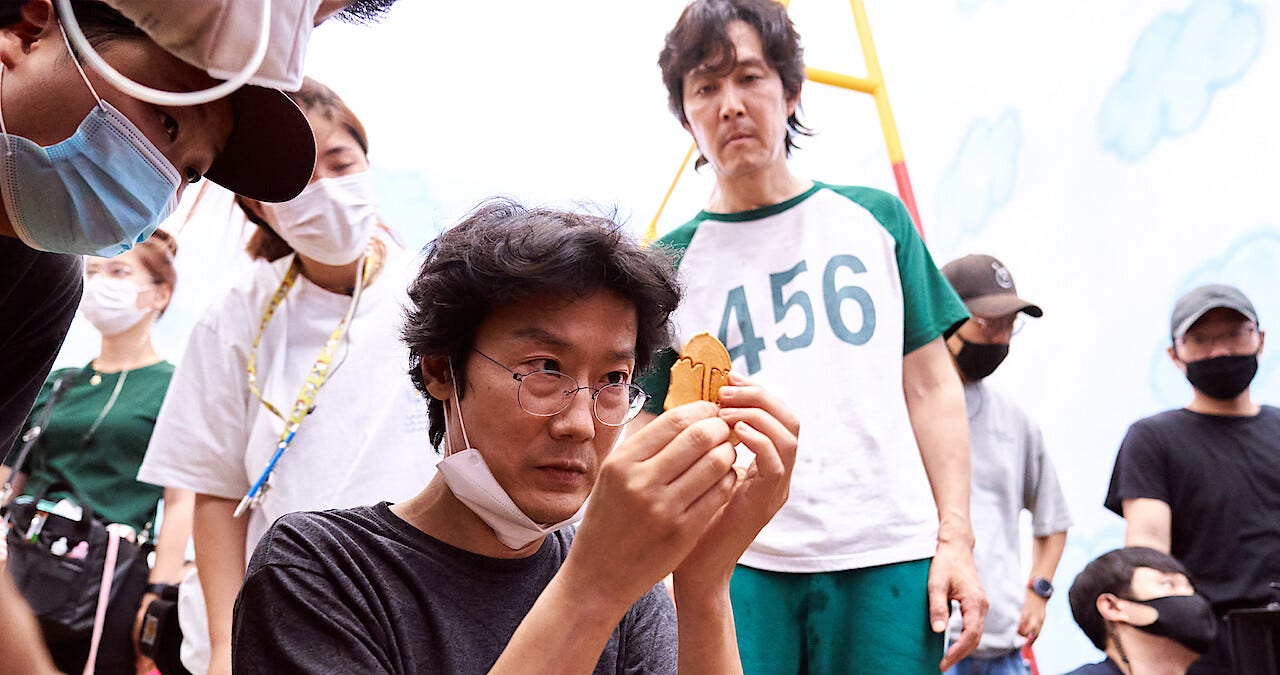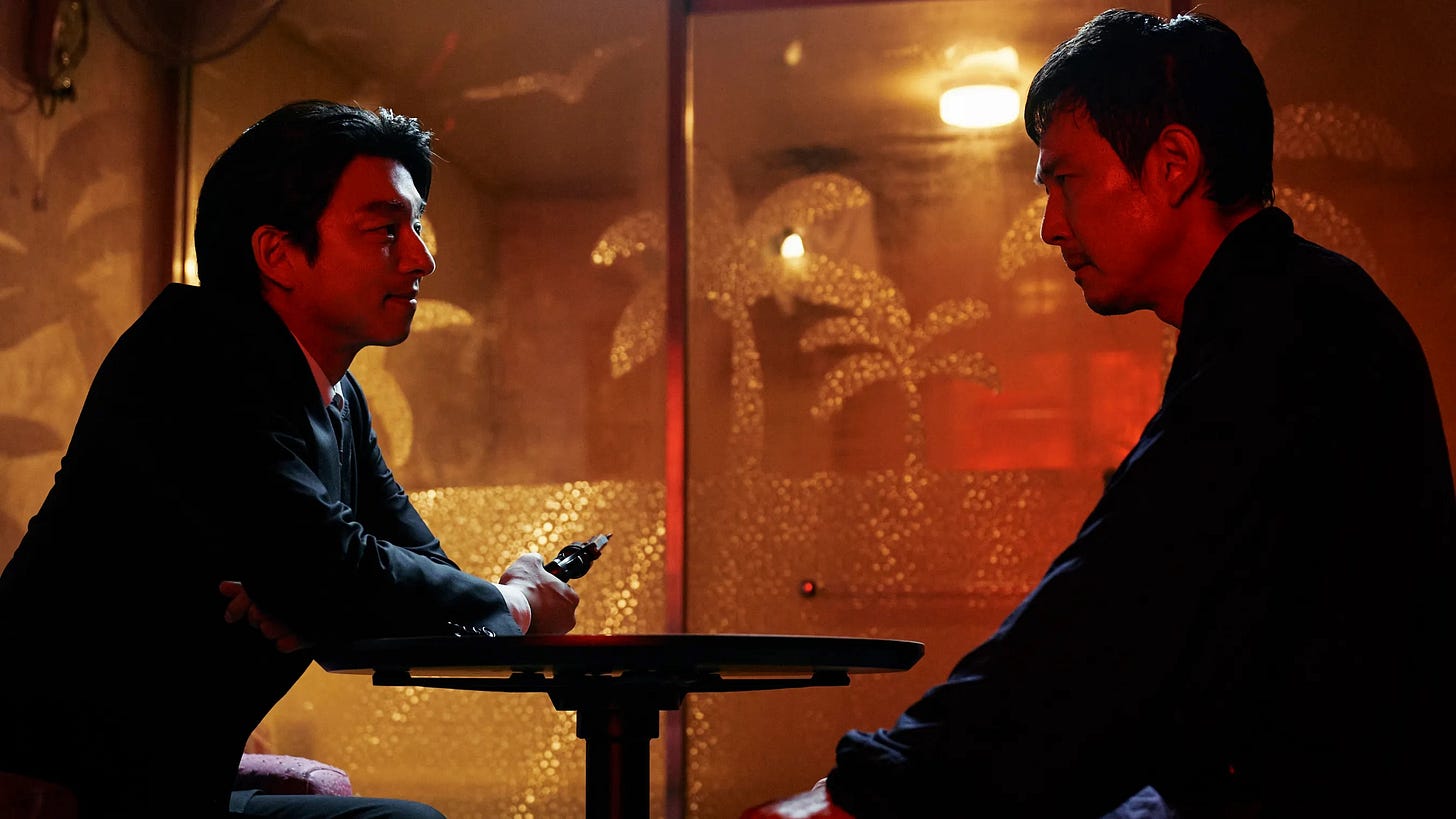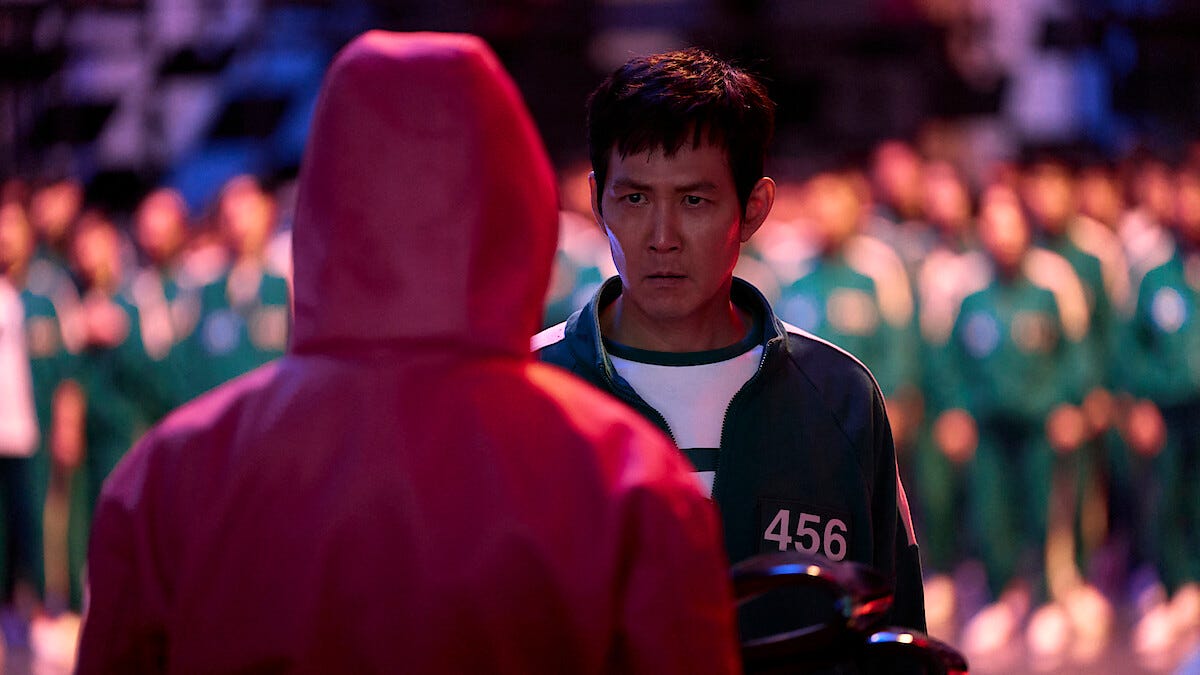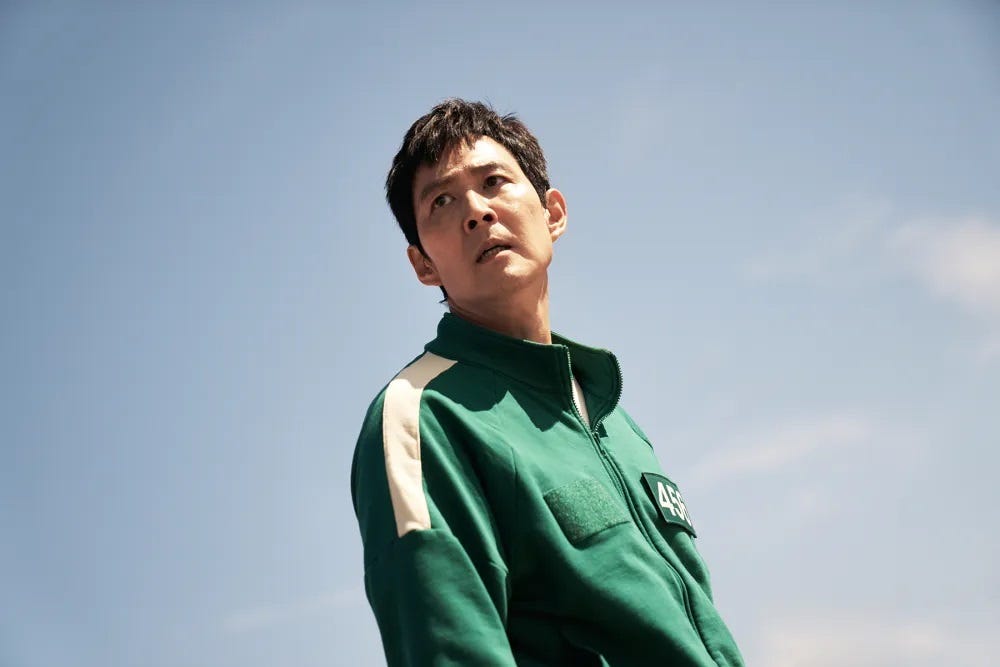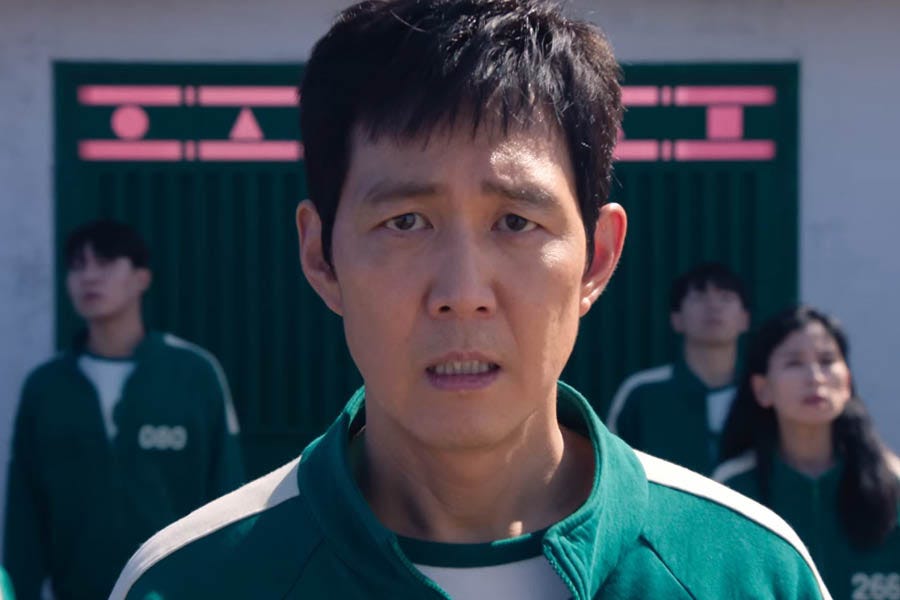The Dystopian Reality of Squid Game 2
Squid Game creator Hwang Dong-Hyuk and star Lee Jung-Jae reveal the real-world struggles and deeper themes driving the high-stakes drama of one of Squid Game 2.
When the Korean dystopian drama Squid Game debuted on Netflix in 2021, it became an overnight sensation, resonating deeply with audiences around the globe. The show takes the survival game concept seen in franchises like The Hunger Games (2012) and Battle Royale (2000), and grounds it in a brutally realistic and eerily familiar setting that is rooted in struggles many of us can relate to.
Squid Game offers a stark reflection on the human condition and the social forces that shape it. Now, with the arrival of Squid Game 2, I had the chance to join an online press interview with the show’s creator, Hwang Dong-Hyuk, and lead actor Lee Jung-Jae, who returns as the protagonist Seong Gi-Hun, the desperate gambler-turned-champion of the Squid Games in the first season.
In the interview, Hwang Dong-Hyuk and Lee Jung-Jae discussed the evolution of the series, its reflections on real-world economic and social divides, and its exploration of humanity’s response to systems that push people to the brink.
Expanding the Squid Game
Expanding a world as distinct and iconic as Squid Game demands precision. The surreal sets, striking visual style, and sharp social critique of the first season were the result of painstaking effort. Series creator Hwang Dong-Hyuk described the process: “Building the world of the first season was the most difficult part. Creating the spaces, wardrobe, and system was like constructing a whole new reality. Every color, every shape, and every detail had to serve the story while feeling distinct and otherworldly.”
With the groundwork laid, the second season offered an opportunity to deepen the complexity of that world. Hwang noted, “This time, I focused on how the world divides people, creating sides and hostilities. I wanted to show how race, religion, and wealth create divides not only in the world we live in but also in the games themselves.”
These fractures, familiar in the real world, take shape in the show’s new “voting” element. After each round, participants vote on whether to stop and share the accumulated winnings or continue to a new round, where each elimination increases the total prize for the remaining players. Survival depends on brutal choices dictated by these same social and economic divides, forcing characters to confront the very forces that shape the world outside the game.
One of the most memorable elements of the first season of Squid Game was the introduction of the “VIPs,” the wealthy onlookers who watched the carnage and chaos from luxury suites. FFor Squid Game 2, Hwang wanted to expand their presence in the story in a subtle way, always felt, but rarely seen. “The VIPs are those who benefit most from maintaining the system — whether through wealth or influence,” he said. “This time, their role is larger, and I wanted their presence to feel more suffocating. It’s about showing how those in power don’t just observe — they manipulate, exploit, and profit from the suffering of others.”
Lead actor Lee Jung-Jae, who returns as Seong Gi-Hun, reflected on how this shift impacted his character’s journey. “For Gi-Hun, the world he re-enters is harsher than the one he left behind,” Lee explained. “He’s more aware of the system now, but awareness doesn’t always mean power. He has to confront new forms of betrayal, new power struggles, and, of course, the growing influence of the VIPs.”
The Search for Truth
At the heart of Squid Game is the evolution of Seong Gi-Hun, portrayed by Lee Jung-Jae. No longer the down-on-his-luck gambler viewers met in the first season, Gi-Hun returns with a renewed sense of purpose. The man who barely survived the nightmare of the first Squid Game is now driven by a bigger question: Can an ordinary man challenge the system that created it?
“Fans loved Gi-Hun’s goodness — his willingness to help others despite his weaknesses,” Lee says. But in the new season, that kindness becomes something sharper. “He’s still carrying that same heart, but now it’s focused on something more.” This time, his goal extends beyond survival. Gi-Hun is on a mission to uncover the truth behind the Squid Games and confront the forces pulling the strings. For Lee, this shift in motivation made playing Gi-Hun a deeper and more personal experience. “There were days when I felt like I was going through what Gi-Hun was,” he admitted, reflecting on how the emotional weight of the story mirrored his own experience on set.
“Gi-Hun’s journey is about asking whether ordinary people like him can change a system that feels impossible to beat,” Lee explains. For the first time in Gi-Hun’s life, he is not just reacting to his circumstances, but rather taking control of his own story. For Lee, this change required a different approach to his performance. “The emotional weight of filming was unique. It mirrored Gi-Hun’s journey in many ways,” he said. The weight of Gi-Hun’s mission — isolated, uncertain, and burdened with responsibility — bled into Lee’s own experience on set. This deeper emotional connection adds richness to Lee’s portrayal, with his own reflections mirroring the character’s isolation and doubt.
This time, the stakes are higher. “The idea of standing up to something bigger than yourself — something so overwhelming — is at the heart of Gi-Hun’s journey,” Lee said. His character’s arc reflects Squid Game’s larger themes, shifting from survival to resistance. In the first season of the show, survival was the ultimate goal. But this season explores something much harder: challenging a system that thrives on power and control.
“It’s a more personal battle this time,” Lee said. Gi-Hun is confronting the moral cost of resistance, the loneliness of taking a stand, and the weight of knowing that survival alone is no longer enough. His journey reflects the show’s broader shift from a story of endurance to one of defiance.
New Layers of Division
The games in Squid Game have always been ruthless, but in Squid Game 2, they become more intricate and morally charged. The introduction of a new voting system forces participants to make decisions that affect not only their own fate but also the lives of others. Creator Hwang Dong-Hyuk explained, “The voting system adds tension beyond the games themselves.” The straightforward win-or-lose dynamic is gone, replaced by something far more unsettling. With the “VIPs” watching gleefully from the shadows, players are compelled to confront each other directly, knowing their choices could spell life or death for someone else.
“The design of the new games reflects the fragility of alliances and the temptations that destroy them,” Hwang explains. In the first season, players formed alliances out of necessity, leaning on one another to endure each challenge. But in this season, that fragile trust is tested as the power to vote enters the picture. “It makes it harder to trust anyone,” Hwang says. “When players have the ability to vote on each other’s fate, it shifts the entire dynamic of the game.” The introduction of voting changes everything. Alliances can crumble with a single vote, and the people you relied on yesterday might betray you today.
For Lee Jung-Jae, the emotional weight of these changes is deeply felt. “The voting system shows the deeper divisions between characters, and those decisions reveal so much about who they are,” he says. In the first season, much of the tension stemmed from survival-driven choices made in the heat of the moment. But with voting, every decision is premeditated. It’s no longer just the instinct to survive, but also the intention to betray, rooted in factionalism. “It’s not just about making it to the next round. It’s about whether you can live with yourself afterward,” Lee reflects. This added layer of psychological pressure shaped how the cast approached their performances, with Lee noting that the emotional intensity of these scenes forced him to dig deeper into Gi-Hun’s internal struggle.
Hwang emphasizes how the new mechanics bring fresh psychological complexity to the characters and their relationships. “Every choice becomes heavier when you know it’s not just about you,” he explains. Trust, already a fragile currency in the first season, becomes even scarcer. With every vote, players must ask themselves how much they’re willing to sacrifice for survival — and how much they’re willing to make others sacrifice in their place. As Hwang puts it, trust becomes as essential as food or water, but once it’s gone, it’s gone for good.
These changes make Squid Game 2 a more intense and morally charged experience. Where the first season tested physical and mental endurance, this season takes aim at the players’ humanity. Hwang and Lee both stress how the show’s exploration of human nature becomes more profound this season, with the themes of betrayal, power, and survival reaching new heights.
A Mirror to Modern Society
While Squid Game operates as a survival thriller on the surface, Hwang Dong-Hyuk makes it clear that its themes hit much closer to home. Squid Game 2 sharpens the show’s critique of inequality, power, and human division. “The games and their consequences are a reflection of how we treat the losers of societal competition,” Hwang explains. To him, the brutality of Squid Game isn’t an exaggeration but an allegory for the pressures people face in a world driven by relentless competition. “There’s a shared experience of struggle,” he says, pointing to how viewers worldwide recognize elements of their own daily lives in the show’s harsh survival dynamics.
This perspective becomes even more pointed in the new season, with Hwang drawing attention to the people who uphold these systems. The “VIPs” from the first season are no longer passive spectators behind glass. Their role has grown, and still in the shadows, their influence is more direct. “They represent those who benefit most from maintaining the system as it is,” Hwang explains. Their actions are no longer confined to observation — they now affect the lives of the players in tangible, consequential ways. It’s a shift that reflects the role of unseen forces in real life, where powerful individuals and institutions shape outcomes for the rest of society.
This expanded role for the VIPs ties into Hwang’s broader critique of wealth and power. “The tragedy of modern life is that the systems of wealth and power are self-perpetuating,” he says. Unlike natural forces that ebb and flow, power consolidates and strengthens over time. The people and systems that benefit from the imbalance have every reason to keep it in place. “They’re not gods, but they act like it,” Hwang says, with a sharp edge of irony. His point is clear — those who hold power will do anything to maintain it, even if it comes at the cost of others.
“If the world is to change, it won’t be because those in power repent. It will be because ordinary people decide to make it better together,” Hwang says. This belief underpins the entire arc of Squid Game 2. The power imbalance is clear, but the solution isn’t to wait for mercy from above. Instead, it’s about ordinary people pushing back, even when the system is designed to turn them against one another.
This shift is reflected in Seong Gi-Hun’s journey, and Lee Jung-Jae sees it as a defining change for his character. No longer just a desperate gambler trying to survive, Gi-Hun enters this new season with a renewed purpose. “Gi-Hun is searching for something more than survival this time,” Lee says. His goals have shifted. “He’s trying to confront what’s behind it all,” Lee explains, hinting at a more active, driven version of Gi-Hun than what viewers saw in the first season of Squid Game. This shift had a personal impact on Lee’s performance as well. Playing Gi-Hun in Squid Game 2 required him to tap into something deeper — the experience of being trapped in an overwhelming system, but refusing to accept it as unchangeable.
Hwang’s storytelling emphasizes this idea of resistance. “Every choice has a cost, and every player has to decide if that cost is worth it,” he says. It’s a theme woven into every frame of the new season, with players forced to make decisions that extend beyond their own survival. These choices aren’t confined to the game, but echo in the real world, where even the smallest personal decisions can have a ripple effect, whether we see it or not.
Reckoning and Resistance
If the first season of Squid Game was about survival, Squid Game 2 shifts its focus to reckoning. The new games bring higher stakes and morally charged decisions, pushing the story into darker, more thought-provoking territory. The show’s critique of wealth, power, and human nature feels sharper than ever, with the introduction of a voting system that shifts the balance of power. “Every choice has a cost, and every player has to decide if that cost is worth it,” says creator Hwang Dong-Hyuk. The focus shifts from mere strategy to morality, as every vote cast carries weight and consequence.
Gi-Hun’s journey mirrors this evolution. No longer just a desperate man scrambling for survival, he becomes an active force for change. “Gi-Hun’s journey is about asking whether ordinary people like him can change a system that feels impossible to beat,” says Lee Jung-Jae. It’s a shift from passive participant to someone willing to challenge the very structure that oppresses him. Lee explains how this change influenced his approach to the character. “Gi-Hun is searching for something more than survival this time,” he says. The emotional weight of this transformation required Lee to channel a deeper, more introspective performance, one that echoes the show’s larger themes of resistance and rebellion.
With striking visuals, layered character arcs, and a bolder exploration of social inequality, Squid Game 2 builds on its predecessor in both scope and depth. More than a simple continuation, this new season reimagines many of the show’s core concepts. The result is a story that grips its audience and refuses to let go, all while challenging them to confront the systems that shape their own lives.
Note: This article is based on the video, audio, and transcription of Netflix’s November 4th Squid Game 2 press conference, conducted with the help of Korean translators. To refine and extract quotes, I utilized advanced translation tools alongside the Sonix transcription service.

